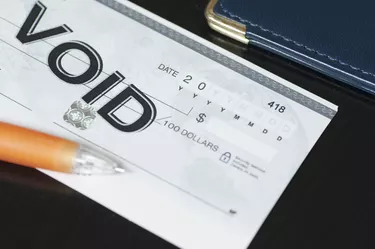
Canceling or voiding a certified check can be a challenge when it's even possible at all. It can't be done as it can be with a regular check.
Federal regulations govern the process, and canceling or voiding a certified check is only permitted under specific circumstances. Unlike with a personal check, the obligated financial institution (that which accepted the check or the one that issued it) can be sued for refusing to honor this type of check.
Video of the Day
Video of the Day
How to Cancel a Certified Check
The Cornell Law School Legal Information Institute cites §3-411 of the Uniform Commercial Code, which states that an obligated bank cannot refuse to pay a certified check unless it has reason to believe that check fraud is involved – maybe the payee isn't actually the individual or the entity that has a right to cash or deposit the certified check – or because the payment is prohibited by law.
The obligated bank can also "assert a claim or defense…that it has reasonable grounds to believe is available against the person entitled to enforce the instrument" – in other words, the person or entity who is demanding payment of the check.
But the New York Credit Union Association cites §3-403(2) of the UCC. This section indicates that payment can be stopped on a certified check if 90 days have passed since it was issued and the check has been lost, destroyed or stolen. The remitter would have to submit an affidavit to the bank or credit union in this case and request a stop payment order in writing.
Common Questions About Voiding Certified Checks
Certified Checks vs. Cashier’s Checks vs. Money Orders: What’s the Difference?
Both cashier's checks and certified checks are guaranteed by the issuing bank, according to Key Bank. A member of the financial institution's staff signs a cashier's check, while a certified check is signed by the customer who effectively buys it for payment to another individual or entity. The paying account is the bank's account in the case of a cashier's check, but it's the customer's savings account or checking account in the case of a certified check.
The amount of the check is essentially frozen in the customer's account so it's available to cover a certified check when it's presented for payment. The check amount is transferred from the customer's account into the bank's account for payment of a cashier's check.
Huntington National Bank indicates that the bank will place a special mark on a certified check, indicating its status after it's established that the paper check hasn't been chemically treated, that the customer's signature on the check is legitimate, that the payee has the authority to issue the check and that the account is in good standing. A cashier's check is issued on a bank check.
As for a money order, anyone can purchase one by simply turning over the requisite amount of cash plus a fee, according to Huntington. This guarantees money orders, in a respect, because they're already paid for. Money orders are typically sold by the U.S. Postal Service, grocery stores, convenience stores and check-cashing stores. A payee doesn't have to be named on a money order.
Can I Stop Payment on a Certified Check I’ve Already Sent?
A financial institution can only stop payment on a certified check if the bank or credit union establishes that one of the conditions cited in the UCC has been met and if the appropriate amount of time has passed. This is the case whether it's been sent to the payee or if you still have it in hand.
What if a Certified Check Gets Lost?
It can be a headache indeed when a certified check is lost. Experian suggests that you immediately notify the issuing bank and get a replacement check, but this won't necessarily stop payment on the original check if other conditions aren't met.
You'll have to post an indemnity bond in order to get a replacement check. Experian indicates that this is essentially insurance, purchased from an insurance company that agrees to pay the initial certified check if it should turn up and be presented for payment. This step is necessary with both certified checks and cashier's checks, according to the NYCUA and Key Bank.
- Cornell Law School Legal Information Institute: § 3-411 ¬– Refusal to Pay Cashier’s Checks, Teller’s Checks, and Certified Checks
- Key Bank: Cashier’s Check vs. Certified Check – What’s the Difference?
- New York Credit Union Association: Stop Payment
- Huntington National Bank: What Is a Certified Check – How & Where to Get a Certified Check
- Experian: What’s the Difference Between a Cashier’s Check and a Certified Check?
- Huntington National Bank: What Is a Money Order?